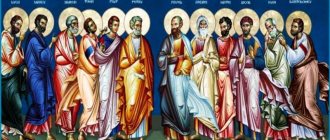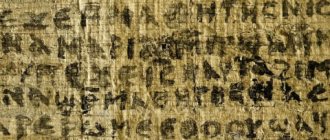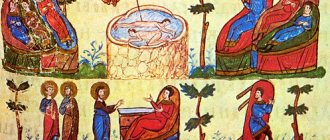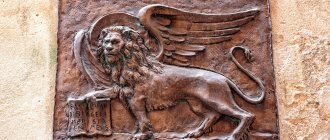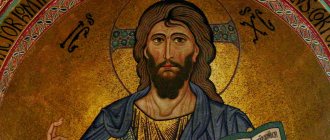Interpretation
In the parable of the Good Samaritan, the Lord answers the question about eternal life. Anyone who believes that the Lord has given him eternal life should understand this parable well and learn these lessons.
Who is a “lawyer”? This is a specialist in the field of law. Not legal, civil or criminal, but in the realm of God's law. That is, one who knows the commandments well. This is a theologian.
What does “tempting” mean? This means that he knows the answer, but is looking for incorrectness in the answer of the answerer, or maybe asks such a question in order to further set some kind of suitable trap and lead to the answerer falling into it and he could be accused of something wrong . The fact is that he reasons incorrectly, does not follow the law, and does not know the commandments well. In other words, to show him in the eyes of his listeners as a failed teacher. Therefore, he asks a question not because he is looking for the truth, but in order to provoke some kind of incorrect answer.
What should you do to inherit eternal life? This is an amazing question, because the Old Testament did not speak so directly about eternal life. On the surface lay those closer to understanding a rough, not very spiritual, material person who is more attached to the earthly. These things, which were closer and clearer to him, represented earthly well-being. Keep the law and the Lord will give you everything. In the Old Testament, only the area of earthly well-being is touched upon. And this person who asks such a question turned out to be insightful enough to see something deeper and spiritual behind all these promises and promises of earthly blessings from the Lord. God's blessing cannot be limited only to earthly well-being. The real and present value of God's blessing lies in the fact that it extends beyond earthly existence - into eternal life.
Often the Lord answers a question with a question when He sees that He is being addressed with deceit. The lawyer, in order to clear himself in the eyes of his listeners (that he did not ask the question with deceit), he said: “Well, yes, this is all clear, but who is your neighbor?” Of course, the question has a basis, since the Jews had disputes on this matter.
Who is the neighbor? Relative or like-minded person? To whom should I show such love as to myself? Not everyone?
In fact, this question sounds very stupid, because the first question is striking in its depth, the second is completely different: everything is clear to a person, but the only thing that is not clear is who needs to be loved.
Jerusalem is a holy city, which is located at an altitude of 800 meters above sea level. It symbolizes the presence of God in God's people. Jericho is a city of sin. It is located in the valley where the Dead Sea is. That is, this city is even 200 meters below sea level. Jerusalem is holiness, Jericho is sin. These are symbols. And so every person who goes from holiness, a righteous life, goes to sin, will certainly fall into the hands of robbers along this path. These are sinful passions or demons that are trying to destroy a person. They wounded him half to death, stripping him of his clothes. They robbed, injured and left. But they didn’t kill him completely, because no sin can kill a person completely as long as the person can repent. Therefore, he is half alive, half dead, but not yet dead. This is the image of all Humanity or each of us.
Do not think that the priest and the Levite are tough people because they passed by. These are symbols of Old Testament religious life. The structure of the Old Testament religion did not save a person, but only gave directions to spirituality (it gave a certain framework, protected a person from falling lower, gave something to a person). But these were half measures. This prepared a person for salvation, but did not save him. Otherwise, Christ (the Good Samaritan) would not be needed.
Since the Old Testament religion could not save man, the priest and Levite pass by. A person is not saved by fulfilling the law.
Christ takes upon himself the image of a Samaritan, because he is not a Jew, but a half-pagan. The Samaritans had the law of Moses, that is, they knew the Pentateuch of Moses, but they had their own pagan beliefs. That is, they seemed to know the commandments of Moses and God, but they added something of their own to this. They were different from the Jews and hated them.
Christ applies the image of the Samaritan to himself in order to show that he is not like all the Jews who wanted to see him in their midst, as such a correct, orthodox Pharisee. He's not like that. He says something that the scribes do not understand. At the same time, by taking such an image upon Himself, Christ shows that He is the Savior only of the Jews, but also of the whole world (of any person, regardless of his tribe).
“Oil” and “wine” are also symbols, but of the New Testament Christian sacraments. At the same time, these are ancient antiseptic medicines. Simple and primitive, but there were no others then. Wine disinfected wounds, and oil softened all sorts of sores.
The “hotel” is a church.
“Two denarii” is the grace of God. The grace of the Holy Spirit, which abides in the church and the sacraments of the church.
An “innkeeper” is a minister of the Church. This grace which Christ gave belongs to Him. And if the priest treats his service with heart and soul, then when the second coming of Jesus Christ and the judgment of God takes place, he will receive a reward.
“Go and do the same” - every person who needs help should be given it. And it doesn’t matter whether it’s a relative or a friend, or maybe some homeless person, you need to act as a good Samaritan would do it.
Good Samaritan: ironic hero or standard
At first glance, doing good deeds is not difficult. But usually it’s easy only as long as you don’t have to sacrifice something to do it. An ironic phrase is often heard addressed to a person whose good deed was accompanied by infringement of his own interests: “good Samaritan.”
In an era when the main values are a high position in society and the size of a bank account, the above statement has lost its original meaning. When using it, many forget that it came from the Bible. And behind this phrase lies one of the main thoughts of the teachings of Jesus Christ.
Good Samaritan (Catholic fresco)
“The Lord says: “Go and do the same, and do the same as the Good Samaritan.” Today we must hear this call and transform it into active love for God and neighbor” (Metropolitan Hilarion Alfeev).
Let's try to figure out who the Samaritan is and why he is good.
Clarifications
The events described in this parable took place more than two thousand years ago. To understand them, some clarification is necessary. First of all, the priest and the Levite are ministers in the Jewish temple. There is a tradition (Law) that prescribes that all Jews are considered close people, obligated to help each other. The priest and the Levite are people who occupy certain positions in the Jewish temple, who thoroughly know the law and traditions, but they do not help the injured Jew.
The Samaritans are heretics for the Jews, whom they considered enemies. It is no coincidence that the parable shows the merciful Samaritan helping the injured Jew, since they were also enemies for the Samaritans. But for Jesus, all people are creatures of God who are equal to each other. Although he did not hide his special attitude towards the Jews.
What does the parable of the Good Samaritan teach us?
“It is very difficult for us to understand the words of Christ: “And you do the same!” It was hard for a person to hear such words. We love those who love us, we hate those who do not love us, we hate those who say some caustic word to us, we do not tolerate criticism of us, even if it is fair. Our pride, our envy, our love of money, our disobedience to the will of God leads a person to terrible consequences - to eternal death. And those robbers (spirits of evil in heaven) who are on our path in life, how they rejoice at our failures, but the main losers are the devil and all his followers,” Vladyka Pavel recalled.
And he added: “We must always remember the words of Christ about the wounds of the soul, which hurt even more than bodily wounds: “Do not fear those who kill the body, but cannot harm the soul, fear the one who, after killing the soul, can cast the soul into Gehenna.”
“Dear brothers and sisters, there are many examples in our lives when we are often mistaken. We can help, but we don't want to. And at the same time we immediately become like the Old Testament priest - we pass by all that is good, all that is holy. We pass by the temple, we pass by the Gospel, we pass by the most important thing in a person’s life. And we must help, bear each other’s burdens, so fulfill the Law of Christ.
Even our faith, even our lives, at times we must sacrifice just to save a few.
This example was shown to us by our parents, our fathers and brothers, who suffered during the Great Patriotic War and did not spare their lives so that only we could live in peace. After all, those who come at us with all untruth and malice, and those who spread this malice, these people are the fiends of hell. These are the people who really don’t have anything life-giving in themselves,” said the rector of the monastery.
He noted that to some extent we are all lawyers: “Christians, we know the Law, the Lord gave us a Commandment, a guide and a Guardian Angel. He protected us from all evil with these good Samaritans. And the Law of His Love lives among us - be merciful, like your merciful Father. And the Apostle Paul says: “Be like me, just as I am like Christ.” Therefore, let this story, this parable serve each of us. Let us study the Law of God not only in order to prick or reproach someone, but in order to fulfill the Commandments. We must remember that while we see God, we will see a person on the path of life with his vices and passions. But God does not disdain him, God does not condemn him, and you are an unrighteous judge. Man, what right do you have to condemn, slander, wish for death, ask for lies for your neighbor? Such a person is like the devil. Therefore, by fulfilling the Commandments of beatitude, mercy and love, we thus draw closer to the Lord.”
What should a parent do if the child is sick and nothing helps?
Who are the Samaritans
To better understand the meaning of the parable in question, you need to know who the Samaritan is. Why did a representative of this particular people become the main character of Christ’s words?
In the speech of the Jews, the word “Samaritan” had a negative meaning and was practically equated with a curse. Orthodox Jews, fearing to be defiled, did not even talk to the Samaritans, since they were half pagans.
After the death of King Solomon at the beginning of the 10th century BC, a great division occurred among the Jewish people. Only two tribes remained faithful to the One God, to whom they prayed in the Jerusalem Temple. They formed their own kingdom of Judah.
The remaining ten tribes, recognizing the true God, also worshiped idols, that is, they fell into paganism. This kingdom, with its capital in the city of Samaria, became known as Israel.
Despite all the mercies that the Lord showed to the kings of the kingdom of Israel, they continued to persist in idolatry. Then the Lord allowed the Assyrian king to conquer the once prosperous Samaria and take all the people into captivity. Pagan immigrants from different countries came to the lands of Israel. However, lions began to come from the desert and attack people. This is how the Lord expressed his anger at the lawless worship of pagan gods and idols taking place here. Then the Assyrian king ordered one of the priests taken into slavery to be sent so that he would teach the tribes living here to worship the True God. Thus, from the pagans, who were subsequently mixed with the remnants of the Jews who returned to these lands, the Samaritan people were formed.
They believed in the One God of Israel, recognized the Pentateuch of Moses as sacred and awaited the coming of the Messiah. But along with this they continued to honor their idols. Because of this, recognizing them as unclean, the Jews hated the Samaritans.
The conflict between them escalated after the people of Samaria built themselves a temple on Mount Gerizim. The offended Jews could not forgive the Samaritans for this. According to Jewish teaching, you can pray to the One God only in the Jerusalem Temple and nowhere else.



